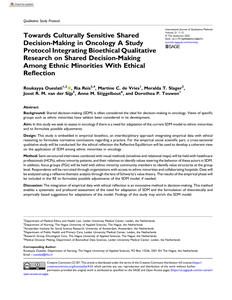Background: Recent studies suggest that ethnic minority students underperform in standardised assessments commonly used to evaluate their progress. This disparity seems to also hold for postgraduate medical students and GP trainees, and may affect the quality of primary health care, which requires an optimally diverse workforce. Aims: To address the following: 1) to determine to what extent ethnic minority GP trainees are more at risk of being assessed as underperforming than their majority peers; 2) to investigate whether established underperformance appears in specific competence areas; and 3) to explore first and second-generation ethnic minority trainees’ deviations. Design & setting: Quantitative retrospective cohort design in Dutch GP specialty training (start years: 2015–2017). Method: In 2020–2021, the authors evaluated files on assessed underperformance of 1700 GP trainees at seven Dutch GP specialty training institutes after excluding five opt-outs and 165 incomplete datasets (17.4% ethnic minority trainees). Underperformance was defined as the occurrence of the following, which was prompted by the training institute: 1) preliminary dropout; 2) extension of the educational pathway; and/or 3) mandatory coaching pathways. Statistics Netherlands (CBS) anonymised the files and added data about ethnic group. Thereafter, the authors performed logistic regression for potential underperformance analysis and χ2 tests for competence area analysis. Results: Ethnic minority GP trainees were more likely to face underperformance assessments than the majority group (odds ratio [OR] 2.41, 95% confidence interval [CI] = 1.67 to 3.49). Underperformance was not significantly nested in particular competence areas. First-generation ethnic minority trainees seemed more at risk than their second-generation peers. Conclusion: Ethnic minority GP trainees seem more at risk of facing educational barriers than the majority group. Additional qualitative research on underlying factors is essential.
DOCUMENT

Calls for greater diversity, especially in relation to the appointment of arbitrators, have been prevalent for some time in the international arbitration community, followed by several initiatives being set up to address the issue. While the primary focus of the diversity debate has been on gender, there have also been calls to expand and diversify the profile of the arbitrator pool to include more non-Western and non-White arbitrators. For several years, scholars and practitioners have argued for countless benefits of increased racial diversity, such as an increased acceptability and legitimacy of the arbitration process. There is a consensus that in a deliberative process like ADR, practitioners should reflect their claimants’ demographics. The existence of diverse panels helps further the aims of meticulous and accurate fact-finding approaches. Similarly, they argue that the lack of racial diversity may directly and negatively affect the quality of arbitration awards. This blog post will focus on the lack of diversity of African arbitrators appointed to resolve international arbitration proceedings, as well as initiatives that are being set up to address such issues. The focus on African ethnicity is given for two reasons: 1) African countries are no strangers to arbitration. Nearly 100 arbitral institutions exist across Africa. 2) There has been an increase of arbitration proceedings emanating from African regions, while there has been a minimal growth in the ethnic diversity of arbitrators appointed to resolve these disputes. This article was originally published on https://commercialarbitrationineurope.wordpress.com/2021/06/29/diversity-in-arbitration-the-lack-of-racial-diversity-in-international-arbitral-tribunals/
MULTIFILE

Background: Shared decision-making (SDM) is often considered the ideal for decision-making in oncology. Views of specific groups such as ethnic minorities have seldom been considered in its development. Aim: In this study we seek to assess in oncology if there is a need for adaptation of the current SDM model to ethnic minorities and to formulate possible adjustments. Design: This study is embedded in empirical bioethics, an interdisciplinary approach integrating empirical data with ethical reasoning to formulate normative conclusions regarding a practice. For the empirical social scientific part, a cross-sectional qualitative study will be conducted; for the ethical reflection the Reflective Equilibrium will be used to develop a coherent view on the application of SDM among ethnic minorities in oncology. Method: Semi-structured interviews combined with visual methods (timelines and relational maps) will be held with healthcare professionals (HCPs), ethnic minority patients, and their relatives to identify values steering the behavior of these actors in SDM. In addition, focus groups (FGs) will be held with ethnic minority community members to identify value structures at the group level. Respondents will be recruited through organizations with access to ethnic minorities and collaborating hospitals. Data will be analyzed using a reflexive thematic analysis through the lens of Schwartz’s value theory. The results of the empirical phase will be included in the RE to formulate possible adjustments of the SDM model, if needed. Discussion: The integration of empirical data with ethical reflection is an innovative method in decision-making. This method enables a systematic and profound assessment of the need for adaptation of SDM and the formulation of theoretically and empirically based suggestions for adaptations of the model. Findings of this study may enrich the SDM model.
DOCUMENT
